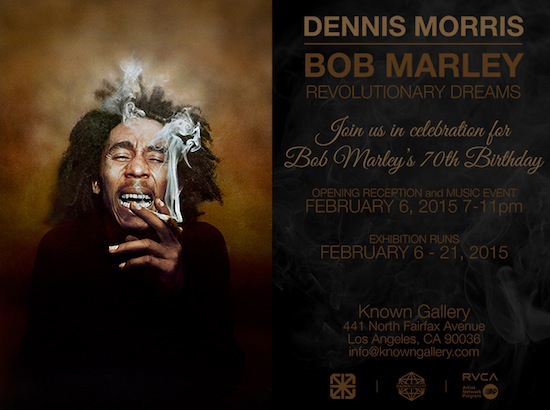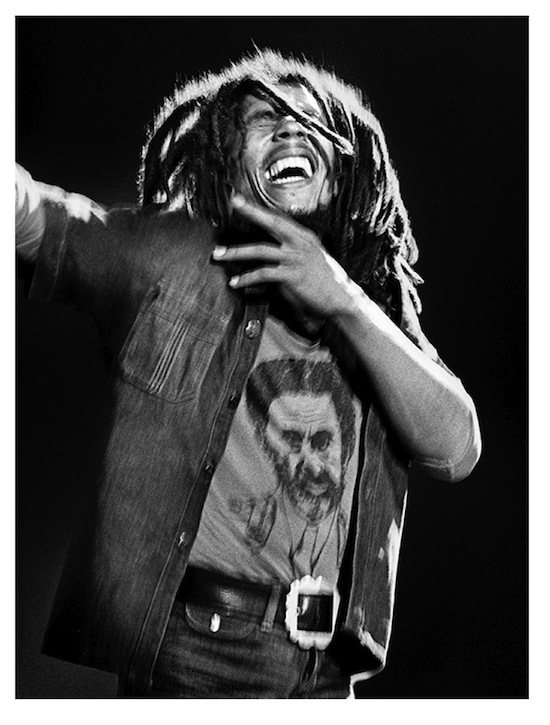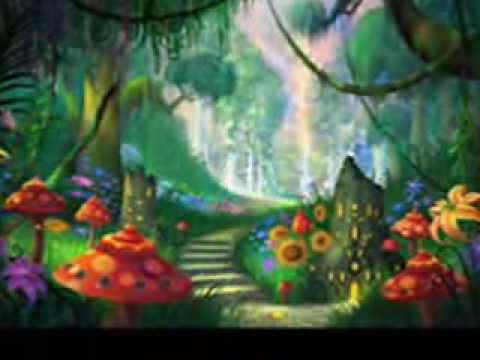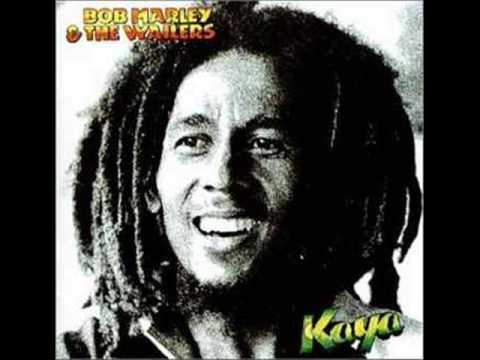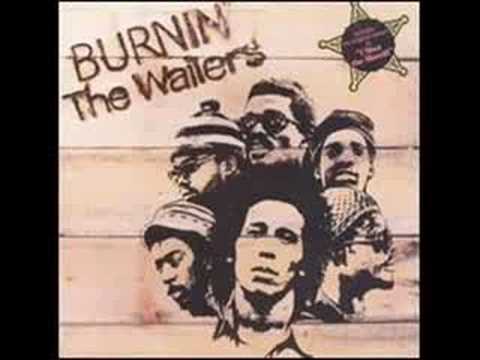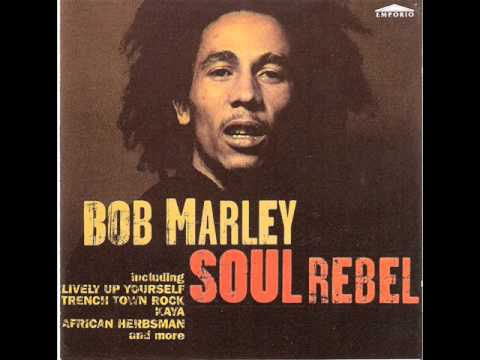Many thanks to photographer Dennis Morris for sorting us out with these great Bob Marley shots.
One of the many things Bob Marley never got to see was the success and impression he left on popular culture by the turn of the millennium. Even outside of Jamaica and the genre of reggae, Marley had immense impact on artists as varied as Paul Simon, Patti Smith, Elvis Costello, Bob Dylan, The Clash and Stevie Wonder but this influence only grew and spread as the years passed. But why does the very mention of his name set alarm bells ringing for so many? It’s hardly a rarity to hear (white) reggae fans decrying his music, perhaps wanting to distance themselves from the pesky perpetrators who adopt his music as a social accessory to go along with their pot leaf baseball caps and blunt rolling techniques, or perhaps there’s even some uncomfortable self-recognition in the sight of gauche undergraduates conspicuously smoking cannabis and declaring everything "irie".
It doesn’t really matter to what extent any of these stereotypes are true or not – presuming that Bob Marley begins and ends with the syrupy and over-egged Legend compilation is the real crime in this scenario. Why does it even matter how other people choose to engage with a giant of popular culture when there’s a vast catalogue of work spanning two decades plus to explore?
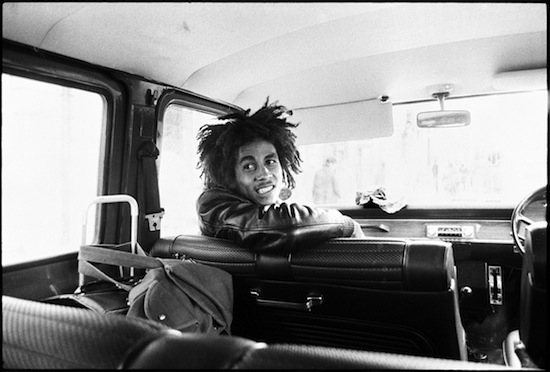
Legend by Bob Marley And The Wailers was released on Island Records in 1984; a vehicle used to expand his legacy and popularity to a mainstream international audience. The album is a best-of featuring his most popular – but by no means best – tracks. And these are songs which pretty much everyone in the Western world knows but that can elicit violent reactions from some quarters. At this point the album has exhausted many once casual Marley fans causing them to dig much deeper but also created a notional block to masses of others that prevents them from exploring beyond the radio hits at all.
So peace to Legend for giving all Marley 101ers, a place to start, a springboard for many to move on to exploring the rest of his music, his life, and his message. The homogenisation of music and the reduction of vast bodies of artistic worth down to a handful of hit singles is unfortunate no doubt but it’s not like it’s difficult to explore back catalogues in 2015.
Below, with YouTubes, I’ve listed ten personal favourites.
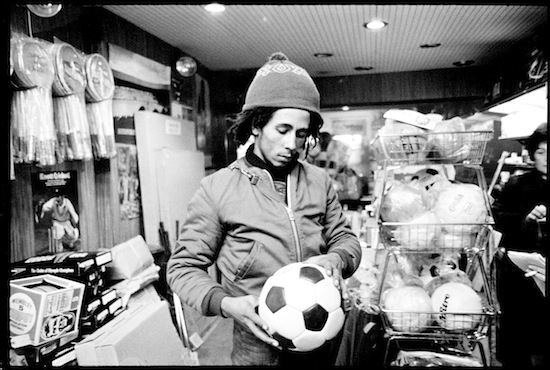
‘Rainbow Country’
Recorded in 1971 ‘Rainbow Country’ is an appropriate title for a track that has such colourful instrumentation and lyricism. The original, very rare single is credited to Bob Marley And The Upsetters and was recorded by legendary reggae maven Lee Perry. Like many of the songs Scratch produced for Bob at the Black Ark it was innovative and ahead of his time. This track features a Rhythm King drum machine, one of the first reggae songs ever to be recorded with programmed rhythms, courtesy of multi-instrumentalist Aston ‘Familyman’ Barrett, Marley’s early 70s right hand man who also plays bass on this track. You can hear the drum machine at use on other experimental tracks such as the notorious single ‘Mr. Brown’.
‘She’s Gone’ – Kaya
Bob Marley wrote some great love songs throughout his life. In ‘She’s Gone’ he croons about his parting with Jamaican model and mother of Damian Marley, Cindy Breakspeare.
Pass It On – Burnin’
This was one of the very first songs, the original Wailer, Bunny, brought to the band. Although Bunny didn’t stick with the Wailers too long after they were signed to Island records, this track made it to the Burnin’ album. It’s a stand out due to it’s gospel feel and you can certainly hear the soulful tones of Curtis Mayfield and the influence of The Impressions at play here. It’s a retreat from the classic reggae one drop drumbeat and shows the talent emanating out of the band before the lone success of Bob Marley.
Trench Town Rock – Original Cuts
A definitive reggae classic. Short, sweet, and impactful. "One good thing about music, when it hits you, you feel no pain". What more could you ask for?
Black Progress
tQ editor John Doran dropped this track on yours truly. ‘Black Progress’ is an early Wailers protest against the oppressive forces of colonialism, paying tribute to the principles of Malcolm X. Musically, it’s a funky and hard driving cut which clearly nods to James Brown’s unofficial civil rights anthem, ‘Say It Loud, I’m Black And I’m Proud’ which Marley works into a medley by the song’s end.
Caution
This originally appeared on The Best Of The Wailers compilation and no Marley fan should pass this song by. It was one of a series of tracks that was recorded by renowned Trojan Records producer Leslie Kong who died of a heart attack the week after they were released in 1970. It’s tough to guess where Marley would have headed if he’d been given the opportunity to continue working with Kong and Lee "Scratch" Perry but there’s little debate over how good he was at the turn of this decade. In this cut you can still hear the original all star line up playing in unison as a band. There is no emphasis on Marley as star in the ascendent frontman (the lyrics are simple and stress the need to keep one’s life in perspective).
‘Concrete Jungle’ Live @ The Old Grey Whistle Test
It’s possible that this live 1973 performance taken from the BBC’s music show The Old Grey Whistle Test will be properly released as a full live album but until then you can find most of the filmed performance on the internet. This particular performance was responsible for bringing Bob Marley And The Wailers up to code with British audiences upon the release of their second album for Island Records, Burnin’. The great thing about this performance is how intimate and raw it is. Everything about it is just so, from the clothes down to the clavinet and chunky wah wah. This is a real clash of the 70s fashion for crafting and refining reggae into a mainstream rock compatible format with earlier 60s trends of psychedelic rock and funk.
‘Walk The Proud Land’ – Talkin’ Blues
Taken from the album Talkin’ Blues, reggae music doesn’t get much funkier than ‘Walk The Proud Land’, which was recorded in 1973 at The Record Plant in San Francisco. This is a Bunny Wailer track which comes on strong with keyboardist Earl "Wire" Lindo laying down the bouncing groove on organ and clavinet, in tandem with a heavy rhythm section and Bob’s light-hearted crooning and scatting.
‘Am-A-Do’ – Talkin’ Blues
Another cut off the Talkin’ Blues album, ‘Am-A-Do’ is hands down a Marley classic. Written by Bob, it’s not entirely clear why this song was previously unreleased until Talkin’ Blues made it to CD in 1991. It hardly appears anywhere else besides this album. Although it may be because it is possibly the most explicit, bordering on slack, song he ever wrote – up there with ‘Kinky Reggae’.
‘High Tide, Low Tide’ – Man To Man
As noted above, the man wrote some amazing love songs and this one is no doubt one of the top ten Bob Marley and The Wailers tracks ever. Recorded between 1972-1973, this track was probably intended for their first Island release Catch A Fire but didn’t actually see the light of day until the 1992 box set, Songs Of Freedom where very little was offered in the way of information in the liner notes. It sounds like a collaborative effort, with perhaps Bunny Wailer having a big hand in the writing judging from it’s infectious melodic and harmonious nature and pleasant doo-wop overtones. Whatever the story however, this is clearly the equal of anything on Legend.
